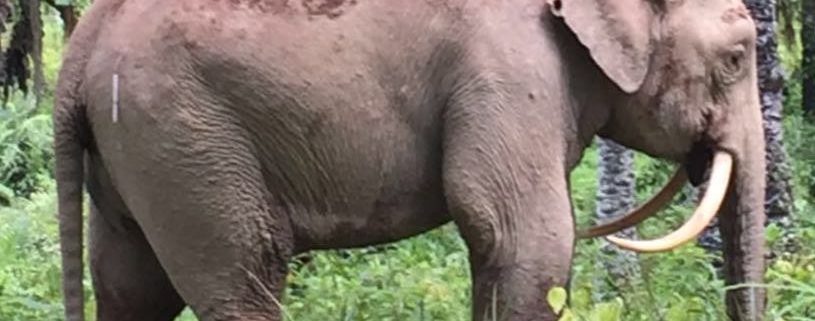Tusk-less Bones Of Beloved Pygmy Elephant Found In Borneo
On New Years Eve, the tusk-less bones of a beloved small elephant named Sabre, was found by wildlife officials in Sabah, Malaysian Borneo.
Sabre was named so because he had unusual tusks which slanted downwards like the extinct sabre-toothed tiger’s canines. Due to the decomposition in the bones that were found, Sabre was most likely killed in late November.
Several days before finding sabre’s bones, wildlife officials found a freshly slaughtered male elephant who had his face cut off in order for poachers to take his tusks. Both Sabre and the unnamed male perished within 1.5km of one another, though a month apart.
Sabre’s skeleton was found just one day after China announced it would ban the ivory trade by the end of 2017.
Borneo’s elephants are the smallest in the world, and have not been affected by the global poaching crisis for ivory until now. Benoit Goossens, director of Danau Girang Field Centre in Sabah, said the grisly finds indicate that a professional hunter and trader may be setting up an ivory trading business in Sabah.

Asian elephants altogether are less of a target for poachers because only some of the males have tusks, compared to African elephants who are a major threat for poachers because all African elephants have tusks. Asian ivory is also considered less valuable than African ivory, due to its brittleness and propensity to yellow.
Sabre was discovered by conservationists on a palm oil plantation in October. In an effort to keep him safe, he was moved to Kawang Forest Reserve where he was satellite collared and then released into the wild.
“We were obviously wrong,” said Goossens.
“There are no words to express our sadness,” said wildlife vet Pakeeyaraj Nagalingam. A member of Sabah’s Wildlife Rescue Unit, Nagalingam aided in Sabre’s rescue and translocation in October.
“It looks like there is no safe place for elephants in Sabah any more. The relevant authorities who are responsible for enforcement of illegal wildlife poaching and other illegal activities must work harder and smarter,” he said.
“The loss of these elephants is especially sad when the world is waking up to the African elephant crisis and closing its domestic ivory markets,” said Elizabeth Bennett, vice president of species conservation at the Wildlife Conservation Society. “Only when all ivory markets are closed and demand for ivory ceases will all of the populations of elephants across Africa and Asia be safe from such poaching.”

Bornean pygmy elephants are about one fifth smaller than other Asian elephants and are gravely endangered. There are only 1,500 to 2,000 living today, in a decreasing habitat fractured by industrial palm oil plantations. Deforestation and habitat loss are the largest threat to the world’s smallest elephants.
Palm oil plantations consider the elephants to be pests, however, they draw tourists to the region and ecologically support the forests and floodplain through seed dispersal.
“My hope is that Sabah wakes up … we are losing our megafauna, the rhino is gone, the banteng [wild cow] is going, the elephant will be next,” Goossens said. “Those crimes should not go unpunished. Let’s not lose our jewels, the next generation will not forgive us.”
Source & Photo Credit: The Guardian




